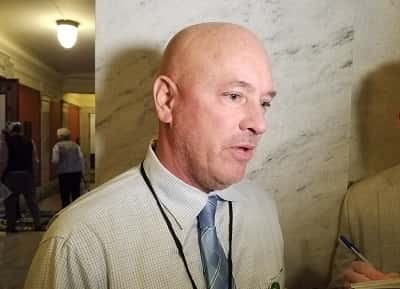
On the last day to file bills for the 2019 legislative session, a measure to reform the Teachers Retirement System was introduced by a recently retired educator.
Rep. Scott Lewis, R-Hartford, a new member of the House who had been superintendent of the Ohio County Schools, is sponsoring the bill.
Lewis says some of the ideas discussed by the Public Pension Working Group are part of his bill.
“But the big thing we tried to do, and I’m for, is keep new hires in the defined benefits system, so it does that, and it addresses some of the other needs that I think teachers would be for. It’s not quite as good as maybe the plan we have now, but it certainly is close.”
He says there are two aspects to the proposed system, the foundation and supplemental.
“The foundation would be like someone’s social security, while the supplemental would be like someone’s 401k. But in this plan, they’re both defined benefits. The teacher could put some of their money into the supplemental plan, if they want that part to go up.”
Lewis said it takes away the ability to retire after 27 years, which will end the practice of teachers retiring in their 40s and drawing benefits for many years.
“This will make you work until you are 55, which is still a young age,” he said. “Any teacher can retire after five years of service at age 55. That is still there.”
The proposal would also save the state money, he said. “Our preliminary estimate is it will save $335 million over 20 years. It will also not add to the unfunded liability. I think it’s a good bill with stakeholder involvement.”
The bill would not affect current teachers or retirees, said Lewis.
“At least new hires going forward would understand that they have a defined benefit, and it spells out for them, ‘If I work until age 55, here’s what I’ll have,’ and I think that’s been the big issue for teachers because we can’t draw Social Security.”
House Minority Leader Rocky Adkins, D-Sandy Hook, said he received the bill as lawmakers convened on Wednesday, so they are still analyzing the lengthy document.
“We’re going to reach out to teacher groups and ask their feelings and reach out to others whom it will potentially impact,” he said. “We understand he had some input from stakeholders, and we want feed back from them on how they feel about the bill.”
Stephanie Winkler of the Kentucky Education Association said “this looks more promising than what has been around the last couple of years.”
House Speaker David Osborne, R-Prospect, said it’s too early to tell if the bill will be able to pass the House, adding, “It’s a starting point.”
Wednesday marked the halfway point of the 30-day legislative session. Lawmakers will meet through March 13, then go into the so-called veto recess, before returning for the final two days of the session, March 28 and 29.
By Tom Latek, Kentucky Today








